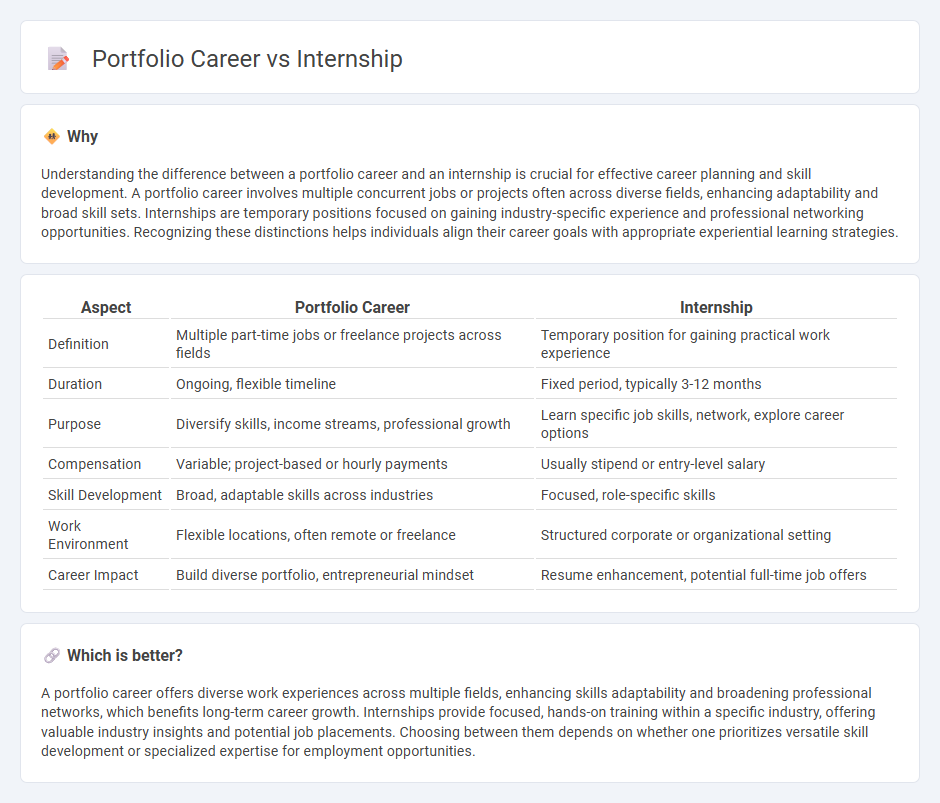
A portfolio career involves building a diverse mix of freelance projects, part-time roles, and entrepreneurial ventures, allowing for flexible income streams and skill development across multiple industries. An internship provides structured, hands-on experience within a single organization, often designed as a stepping stone to full-time employment and professional networking. Explore the key differences and benefits of each path to determine the best strategy for your career growth.
Why it is important
Understanding the difference between a portfolio career and an internship is crucial for effective career planning and skill development. A portfolio career involves multiple concurrent jobs or projects often across diverse fields, enhancing adaptability and broad skill sets. Internships are temporary positions focused on gaining industry-specific experience and professional networking opportunities. Recognizing these distinctions helps individuals align their career goals with appropriate experiential learning strategies.
Comparison Table
| Aspect | Portfolio Career | Internship |
|---|---|---|
| Definition | Multiple part-time jobs or freelance projects across fields | Temporary position for gaining practical work experience |
| Duration | Ongoing, flexible timeline | Fixed period, typically 3-12 months |
| Purpose | Diversify skills, income streams, professional growth | Learn specific job skills, network, explore career options |
| Compensation | Variable; project-based or hourly payments | Usually stipend or entry-level salary |
| Skill Development | Broad, adaptable skills across industries | Focused, role-specific skills |
| Work Environment | Flexible locations, often remote or freelance | Structured corporate or organizational setting |
| Career Impact | Build diverse portfolio, entrepreneurial mindset | Resume enhancement, potential full-time job offers |
Which is better?
A portfolio career offers diverse work experiences across multiple fields, enhancing skills adaptability and broadening professional networks, which benefits long-term career growth. Internships provide focused, hands-on training within a specific industry, offering valuable industry insights and potential job placements. Choosing between them depends on whether one prioritizes versatile skill development or specialized expertise for employment opportunities.
Connection
A portfolio career offers diverse professional experiences across multiple roles, enhancing skills and marketability, which directly benefits from internships as practical training grounds providing industry-specific exposure and real-world applications. Internships contribute to building a robust portfolio by allowing individuals to accumulate varied competencies and professional achievements that support a dynamic and flexible career path. Combining internships with a portfolio career enables continuous skill development and adaptability in evolving job markets, increasing employment opportunities.
Key Terms
Experience
Internships provide structured, hands-on experience in a specific field, often under the guidance of seasoned professionals, allowing for skill development and industry insight. A portfolio career involves managing multiple part-time roles or freelance projects across various sectors, showcasing versatility and a broad range of experiences. Explore the benefits and challenges of each path to determine which aligns best with your professional goals.
Flexibility
Internships provide structured, time-limited work experience often within a single organization, offering limited flexibility in schedule and role variation. Portfolio careers encompass multiple concurrent or sequential roles across different fields, maximizing flexibility by allowing professionals to tailor their work patterns and diversify income streams. Explore how embracing a portfolio career can enhance your work-life balance and professional growth.
Skillset
An internship provides hands-on experience and practical skills within a specific industry, essential for building a strong foundational skillset. A portfolio career offers diverse skills across multiple disciplines, enhancing adaptability and broad professional expertise. Explore how each approach can shape your skill development for career success.
Source and External Links
Internship - Wikipedia - An internship is a period of work experience offered by an organization for a limited time, allowing students and graduates to gain skills and experience in a particular field.
What Is an Internship? - UMBC Career Center - An internship provides a professional learning experience with practical work related to a student's field of study, allowing for career exploration and skill development.
Internship Meaning and Definition: A NACE Guide - NACE defines an internship as a form of experiential learning that integrates classroom knowledge with practical application in a professional setting.
 dowidth.com
dowidth.com